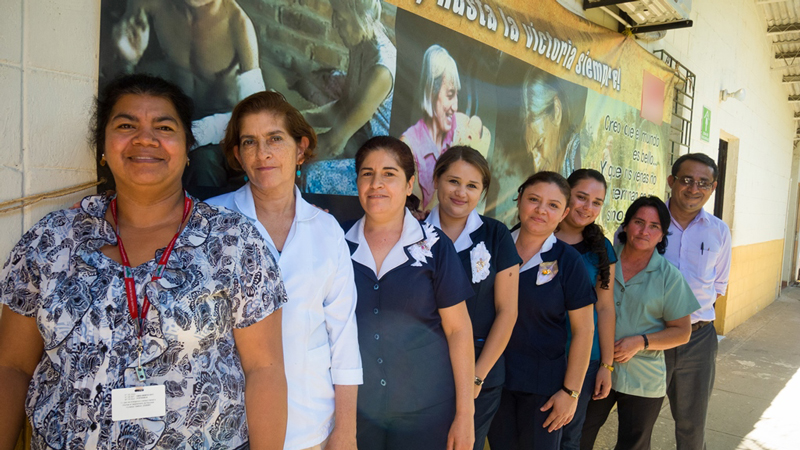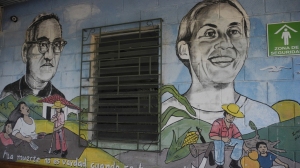12 Years of progress – CAFOD’s development work
Tania Dalton works in CAFOD’s Latin America Team. As we celebrate the success of our two year water project in Kitui, Tania reflects on the long-term development projects she’s been part of in her time with CAFOD, and their ongoing impact today.

I am blessed to work in CAFOD’s Latin America team: my life is constantly enriched by the people I encounter. Seeing change over time is especially wonderful. The Ana Manganaro Clinic in Guarjila, El Salvador, is a great example of taking the long view. I visited it first in 2004, and again earlier this year. In those twelve years, it transformed from a small building where community health workers received training in the yard, to a comprehensive rural health centre, with a maternity care unit, dentist, nutritionist, physiotherapist and other key health services. In 2010, the clinic integrated with the Ministry of Health. Now it serves 16,500 people across eight municipalities and is recognised as a model for rural health services.
Find out about our latest Hands On project in Bolivia
Marlene, my guide when I visited this year, helped me to appreciate fully the transformation of the clinic.
Guarjila is a village in an area of El Salvador that suffered high levels of fighting and repression during the civil war in the 1980s. Thousands of people from rural areas fled the violence that was to claim 75,000 lives, crossing the border to refugee camps in neighbouring Honduras; Marlene and her family were among them. At the time, CAFOD was supporting refugees in the camps. When she was 12, Marlene started working in the camp hospital. In 1987, her family was among a group of refugees who decided to return to rebuild their lives in Guarjila, despite the war they had fled still being in full spate. She recalls, “there was nothing here – it was a desert. Just grass. Our parents decided to stay and built a house with the grass. There was a stream, but not much water, so we used plastic to collect water for washing up and bathing.”
Explore the story of the community of Kitui, who brought water back to their land

Sr Ana Manganaro, a missionary nurse, soon arrived, seeing the need to treat the war-wounded. Marlene says, “the communities got organised and trained health workers and midwives. Ana taught first aid, basic and advanced, so health workers could attend to straightforward cases.” Still a young girl, Marlene was trained by Sr. Ana Manganaro. She continues, “Ana decided to visit each community once a month. We walked to the communities, even through the conflict. Sometimes we had to stop and wait for crossfire or aerial bombings to cease.”
Peace came in the 1990s, but a heavy military presence was maintained in Guarjila, as it was considered a hotbed of rebellion. The community managed to build a clinic, by their own labour, carrying the materials on their heads as they walked through the night to avoid soldiers, as permission to transport the materials had been denied. The government told Marlene she would not be able to continue working as a nurse without the right qualifications. Today Marlene stresses how grateful she is that CAFOD paid for her to study. Now she is employed by the Ministry of Health as a nurse at the clinic.
Be part of a project that transforms a community
In the early days, our grants helped the clinic to buy medicines and equipment, train health workers, conduct preventative health campaigns, and run the ambulance. Despite the recent agreement with the Ministry of Health, our support still covers budget shortfalls: maintaining one of the two ambulances, paying for public health education programmes and the salary of the person maintaining patient files.
Marlene says without CAFOD’s long support, it is unlikely the dream of a comprehensive health service in Guarjila would have become reality. I say we should recognise the determination and resilience of Marlene and the returned refugee community of Guarjila.
Tania. This is a really inspiring and heartwarming story. Bernard